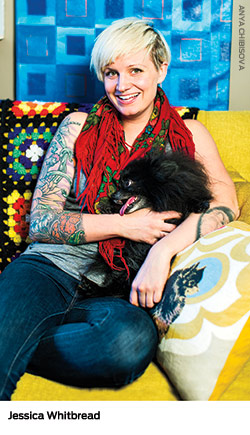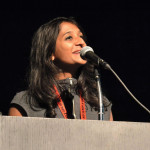 When Jessica Whitbread, a queer, white girl from the Canadian suburbs, got her positive HIV test result 13 years ago, she was shocked. But after the news set in, the then-21-year-old feminist decided that the diagnosis could become part of her dream, not her downfall.
When Jessica Whitbread, a queer, white girl from the Canadian suburbs, got her positive HIV test result 13 years ago, she was shocked. But after the news set in, the then-21-year-old feminist decided that the diagnosis could become part of her dream, not her downfall.
“I remember thinking, ‘Well, I want to be a sex educator, so at least now I have a foot in the door,’” Whitbread recalls. “But how am I going to be a sex educator if I can’t even have sex?”
So the young student, who had just moved to Montreal to pursue her degree in education, became poised to find ways to break down social barriers between her sexuality and HIV.
Whitbread started pushing back with an underwear dance party called No Pants No Problem, a sex-positive, anti-stigma party where people are encouraged to explore safer sex and think about gender norms.
Then she moved to art activism, creating posters, banners and other demonstrations designed to open a dialogue about HIV. Since 2011, Whitbread has worked alongside fellow activist Alex McClelland to curate posters that address the issues of criminalization, nondisclosure and the ideas of sexual privilege within our society. Their efforts culminated in a project for AIDS ACTION NOW! called posterVIRUS.
“I try to create spaces that are meant to purposely provoke,” says Whitbread, who is now 33 and bases her activism in Toronto.
But Whitbread isn’t your typical on-the-streets activist either. In November 2012, she became the youngest global chair for the international steering committee of the International Community of Women Living With HIV (ICW), as well as the first queer woman to hold the title. She is now pushing to bring the group onto a much larger platform among today’s modern sexual movements.
“At a recent strategic meeting at ICW, we asked, ‘Are we a women’s rights organization, or are we a feminist organization?’” Whitbread says. It’s a tricky distinction—the former seeks laws, rights and safety for women, while the later offers a cultural and social lens for viewing the world. “We decided that we were going to use both frameworks to guide our work, to shift and to look at gender oppression and how that affects the lives of women living with HIV.”
To help with that goal, Whitbread recently published a coffee-table book titled Tea Time: Mapping Informal Networks of Women Living with HIV. By looking at personal letters written by HIV-positive women, it explores the community-building and health needs they address.
“I want to be seen as more than an HIV activist,” Whitbread says, “[But] as someone who is doing work beyond that.”
Beyond the Boundary






2 Comments
2 Comments